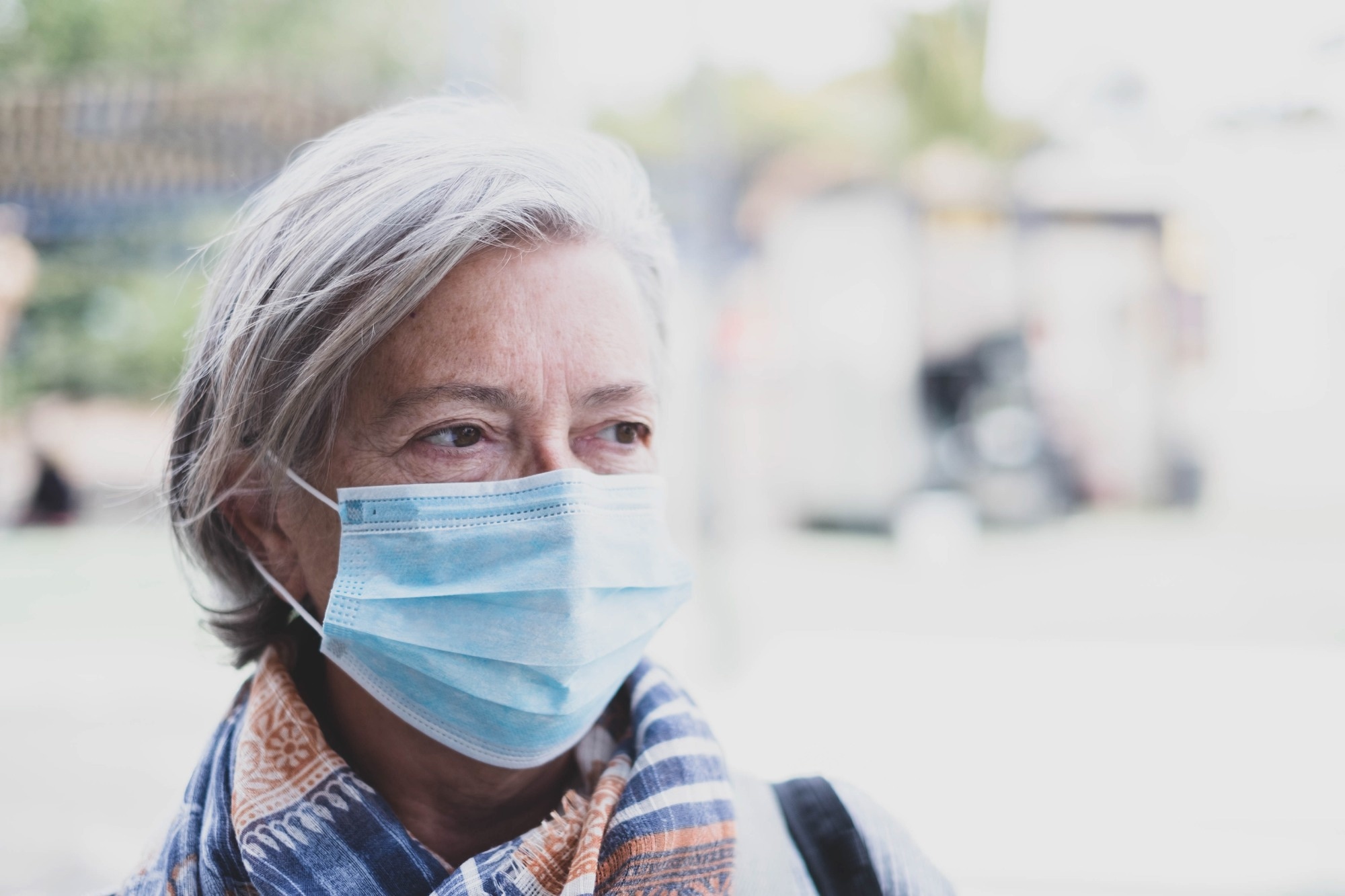They synthesized evidence separately for both settings and from randomized controlled trials (RCTs) and observational studies.
 Study: Major Update: Masks for Prevention of SARS-CoV-2 in Health Care and Community Settings—Final Update of a Living, Rapid Review. Image Credit: Perfect Wave/Shutterstock.com
Study: Major Update: Masks for Prevention of SARS-CoV-2 in Health Care and Community Settings—Final Update of a Living, Rapid Review. Image Credit: Perfect Wave/Shutterstock.com
Background
Masks are respiratory protective devices that reduce the risk of contracting coronavirus disease 2019 (COVID-19, a lethal and infectious disease caused by SARS-CoV-2, in different settings, e.g., home, outdoors, community places, and workplaces like offices and hospitals where viral exposure levels vary substantially.
Other factors affecting the effectiveness of masking include circulating viral variants and their transmission levels, the immunity level of an individual, and behavior, e.g., adherence to infection control measures.
Yet, it remains unclear to what extent the use of masks could prevent COVID-19 in different settings.
In June 2020, the authors published the first version of a rapid review on mask use and its association with the risk for SARS-CoV-2 and other respiratory infections like influenza.
Subsequently, they published eight more updates demonstrating a link between mask use and decreased risk for SARS-CoV-2 infection in community settings based on moderate strength evidence gathered from two RCTs and 10 observational studies.
About the study
In this study, the researchers focused on retrieving the latest, most recent evidence (data) of the usefulness of three types of masks, viz., N95 respirators, surgical masks, and cloth masks, which vary in fit, filtration efficacy, and fluid resistance in preventing SARS-CoV-2 infection across different settings based on three RCTs and 21 observational studies.
They retrieved these RCTs and studies from PubMed, MEDLINE, Elsevier EMBASE, and medRxiv through an extensive search, which the team conducted between 3 June 2022 and 2 January 2023.
Further, the researchers used an updated protocol for this study. So, they relied on studies solely focused on self-report for SARS-CoV-2 infection diagnosis and non–peer-reviewed studies.
In addition, they removed questions on influenza or influenza-like illness, SARS-CoV-1, and Middle East respiratory syndrome (MERS) coronavirus infections.
Also, they used standard systematic review methods, including dual abstract review. Overall, in this study, the researchers focused on two key questions, as follows:
i) What are the efficacy and comparative efficacies of respirators (N95 or similar masks), cloth, and face masks (surgical) in preventing SARS-CoV-2 infection in high vs. non-high-risk settings?
ii) Does extended or reuse of N95 respirators prevent SARS-CoV-2 infection?
The study outcomes encompassed SARS-CoV-2 infection and related hazards, as assessed by laboratory testing. Finally, the team updated an evidence map depicting the strength of evidence (high, moderate, low, or unclear due to inadequate evidence) and effect direction for each mask comparison across both settings.
Results
Similar to previous updates, the authors found low to moderate strength evidence for community settings via RCTs, which suggested that mask use correlated to a 10% to 18% risk reduction for SARS-CoV-2 infection vs. no mask.
It could be significant on a population level, considering the cumulative effects of masking over time.
Only one RCT documented imprecise estimates without considering masks as a source of infection control. Two other RCTs varying in interventions and settings found that interventions aimed at increasing mask use reduced the risk of SARS-CoV-2 infection.
Observational studies consistently found that masking was associated with reduced risk for SARS-CoV-2 infection vs. no-masking in community settings.
The strength of evidence on surgical vs. cloth masks, more masking vs. less masking, and consistent masking remained inadequate.
In healthcare settings, a recent RCT revealed that the effects of surgical masks were non-inferior to N95 respirators for day-to-day patient care, but the evidence strength was low. Also, this analysis was post-hoc and based on self-reported viral exposures.
Its results did not vary even after stratifying patients based on the presence of nonwork exposures. Moreover, this RCT was performed across four countries, viz., Egypt, Pakistan, Canada, and Israel, which varied in terms of vaccination coverage and COVID-19 seroprevalence, to name a few.
Owing to their methodological limitations and inconsistencies, all included observational studies fetched inadequate evidence of the usefulness of N95 vs. surgical masks in healthcare settings and the risk of COVID-19.
Notably, while observational studies primarily evaluated outcomes associated with actual mask use, RCTs evaluated all interventions that promoted increased mask use.
Thus, a new RCT comparing mask types in healthcare settings triggered the researchers to publish this update.
Lastly, the researchers found limited evidence of the harms of masking. Only one new RCT demonstrated that N95 use increased the risk for mask-related harm(s) vs. surgical masks. However, they observed no serious events due to using N95.
Conclusion
This final update differed from previous systematic reviews on masks, as it focused solely on SARS-CoV-2 infection and included a new RCT. In addition, they prospectively changed the study protocol to focus on higher-quality studies and more relevant evidence.
Though the evidence base and review process had limitations, excluding some previously included studies did not affect the current findings.
Future studies with sufficient statistical power for primary and stratified analyses could clarify the comparative effectiveness of masks in preventing SARS-CoV-2 infection.
Additionally, they should use appropriate methods for describing key mask characteristics, their harms, benefits, and adherence.
To conclude, this update evidenced that surgical masks and N95 respirators both similarly reduce the risk of SARS-CoV-2 infection in healthcare settings, and one should not overlook the usefulness of N95 respirators.